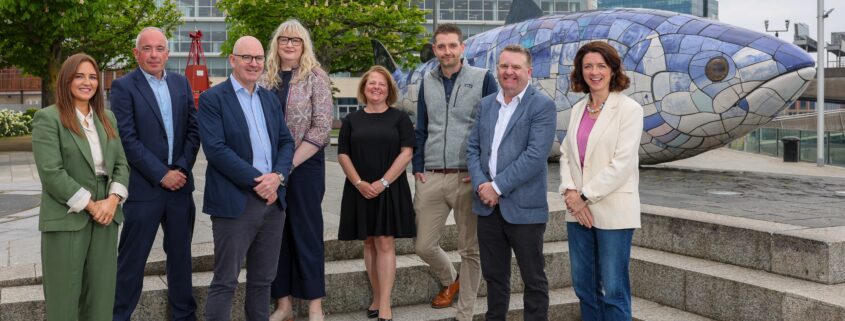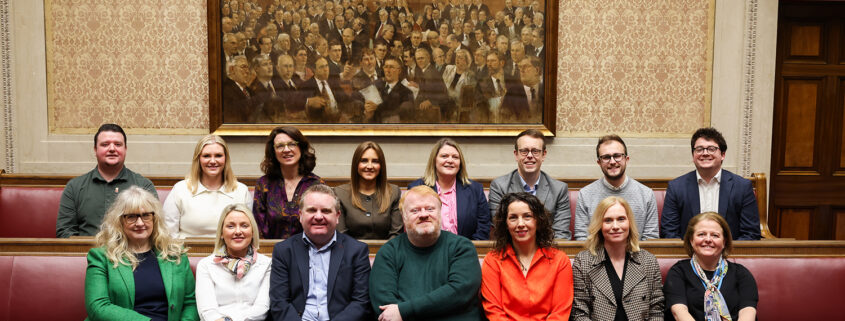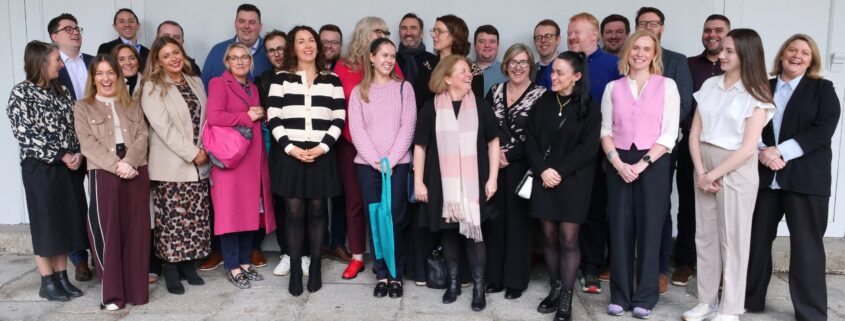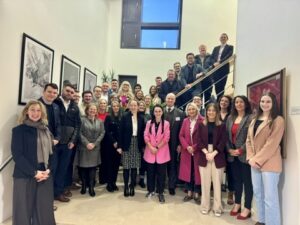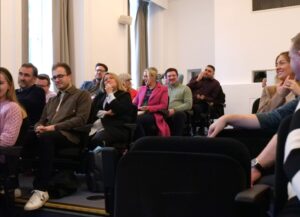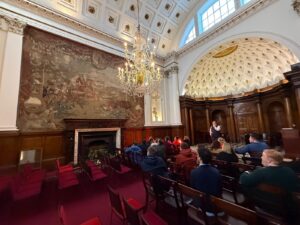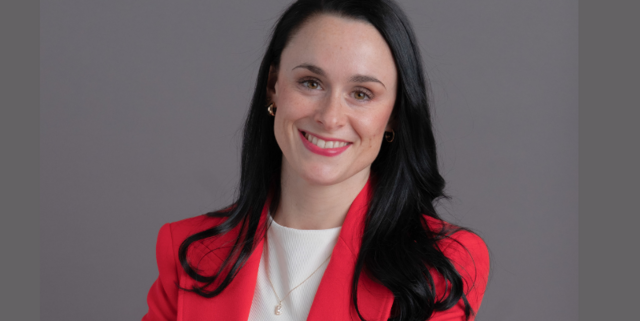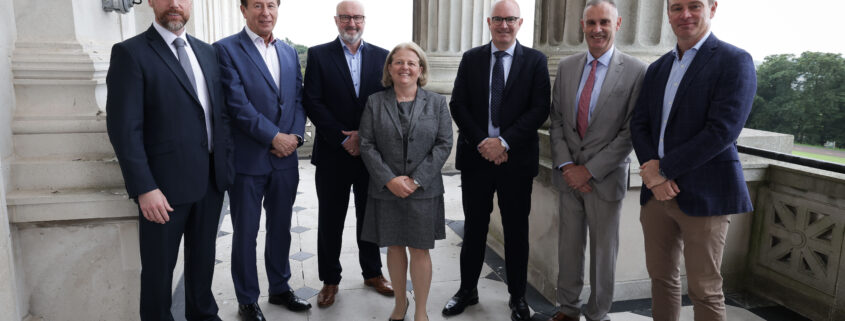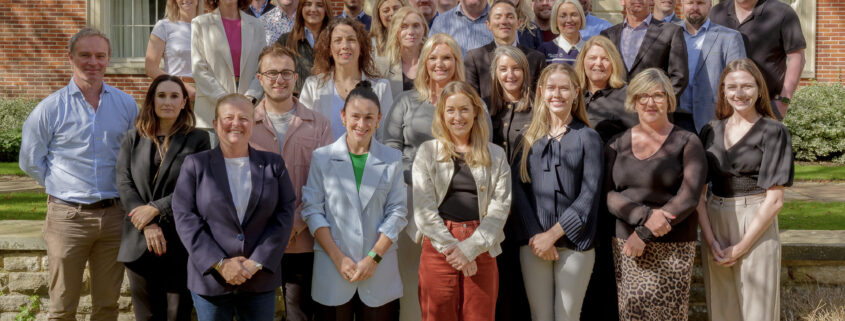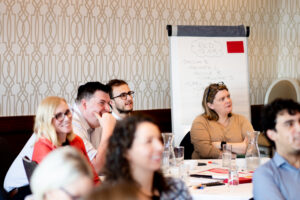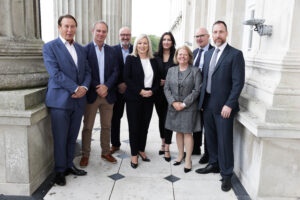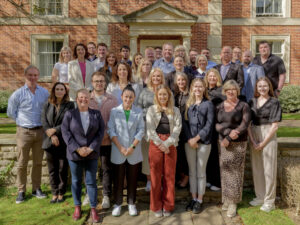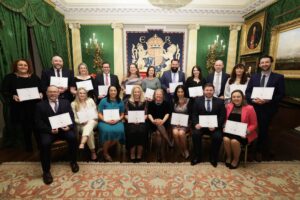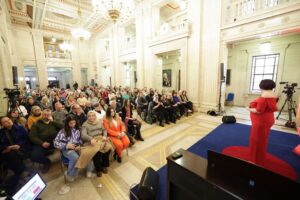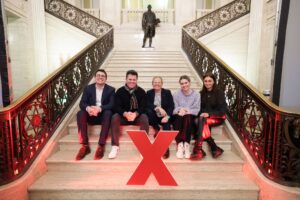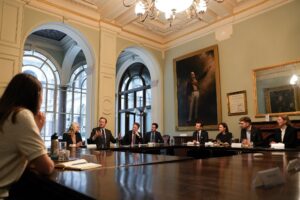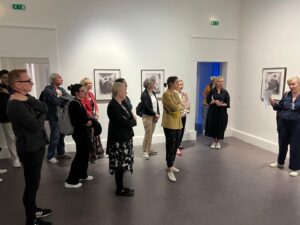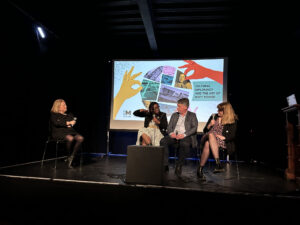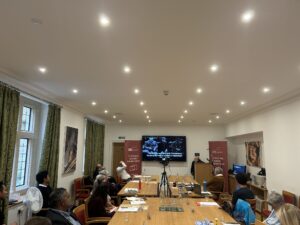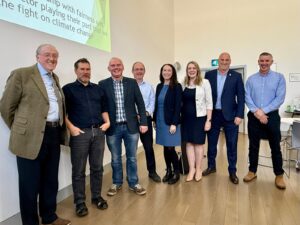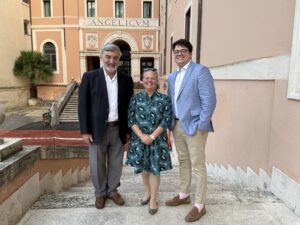Business leaders launch applications for Fellowship Programme
Businesses in Northern Ireland are supporting an initiative to give leaders from politics, business and civic society a unique opportunity to develop the skills needed to address the leadership challenges of today.
The Centre for Democracy and Peace has opened applications for its Fellowship Programme 2025-26 to address real-world challenges and equip Fellows with practical skills in complex decision-making, design thinking, and collaboration, which are essential for navigating today’s economic, political, and social landscape.
Now in its fifth year, and with almost 100 alumni, the Fellowship Programme offers immersive residential sessions in Oxford and Dublin and allows participants to gain experience in world-class thinking and global best practice.
Supported by leading organisations including Camlin Group, Fujitsu NI, FinTrU, NIE Networks, Ulster Carpets, the Irish Department of Foreign Affairs and Trade, the Irish American Partnership, and Allstate NI, the Fellowship reflects a shared commitment to investing in the sustainable peace and prosperity of Northern Ireland.
The programme is guided by an accomplished advisory board of senior business leaders who bring strategic insight, operational expertise, and a deep understanding of leadership in complex environments.
Together, they help shape a Fellowship experience grounded in real-world societal challenges, equipping participants with the adaptive thinking, collaborative mindset, and systems leadership needed to drive innovation, strengthen organisational resilience, and support long-term economic development.
By investing in the Fellowship, leading businesses are playing an active role in developing leaders capable of navigating complexity, generating innovation, and driving meaningful change across Northern Ireland.
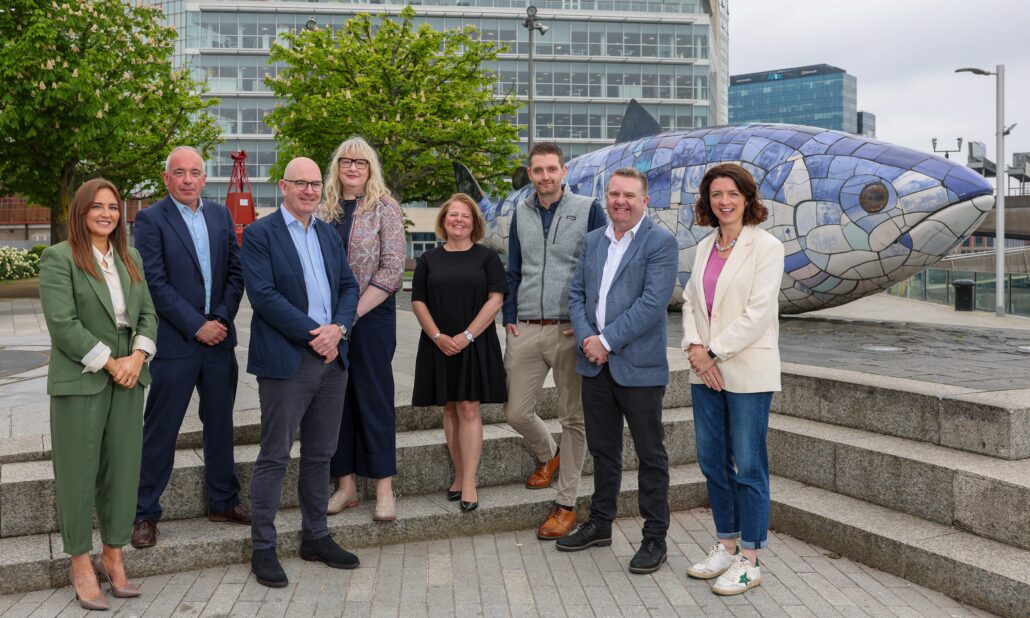
(L-R) Karen Gilgunn, Mencap NI, Derek Hynes, NIE Networks, Darragh McCarthy, FinTrU, Shauna Mageean, Northern Ireland Assembly, Eva Grosman, Centre for Democracy and Peace, Phillip Brett, MLA, Cahir Hughes, Electoral Commission, Róisín Finnegan, Independent Business Consultant.
Phillip Brett MLA, Northern Ireland Assembly Economy Committee Chair, and Programme Alumnus said:
“The Fellowship’s focus on systems thinking and entrepreneurial leadership aligns closely with key economic priorities, including the skills agenda. It offers unique value to Northern Ireland by supporting the development of confident, collaborative, and forward-thinking leaders.
“Taking part in the Fellowship was a truly transformative experience. It challenged my thinking, expanded my networks across all sectors, and strengthened my ability to lead with purpose. I would encourage anyone committed to building a better future for Northern Ireland to apply.”
Darragh McCarthy, Chair, Fellowship Advisory Board, added:
“The Fellowship is not just an investment in individual leaders, it’s an investment in the future of Northern Ireland’s business, civic, and political success. By bringing together ambitious leaders from across all sectors, the programme creates conditions for innovation, trust, and long-term collaboration.
“I look forward with great anticipation to seeing the unique talents and perspectives the future group of Fellows will bring, and how they will shape one another as leaders and our society.”
Applications for the 2025/26 Fellowship Programme are now open and will close on Thursday 5 June.
To apply or learn more, visit https://fellowship.democracyandpeace.org or contact fellowship@democracyandpeace.org.
Fellowship Project Calls for Action on Abuse of Political Candidates in Northern Ireland
A group of leaders from the Centre for Democracy and Peace’s Fellowship Programme have designed a new initiative tackling the abuse and intimidation faced by political candidates in Northern Ireland. As part of the programme’s design thinking module, the team explored real-life challenges and developed solutions aimed at fostering a safer and more inclusive political environment.
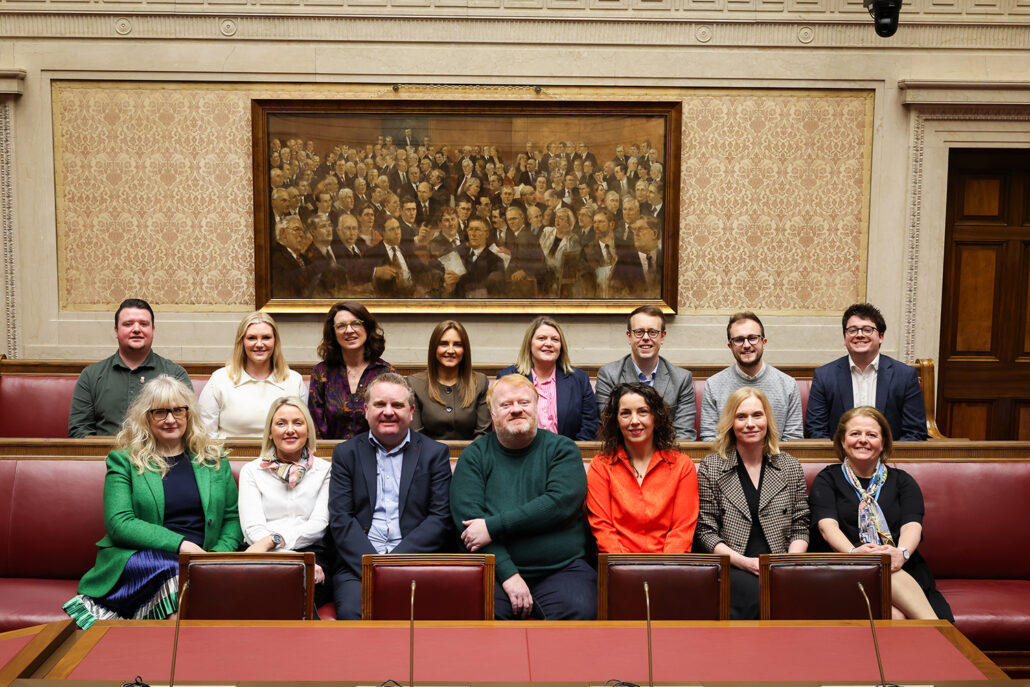
Backed by the Electoral Commission Northern Ireland, the project comes in response to alarming statistics: 71% of candidates in the 2022 Northern Ireland Assembly election experienced abuse, threats, or intimidation. This rising hostility disproportionately affects women and ethnic minorities, discouraging individuals from standing for office and threatening the integrity of democracy itself.
During the project, Siobhán McAlister (SDLP) and Cllr Alan Lewis (DUP) shared deeply personal stories of abuse they have faced as political figures. Their experiences underscored the urgency of the issue, prompting other members of the Fellowship cohort to collectively seek out innovative solutions.
The Design Thinking group has put forward a coordinated approach to combat abuse, including:
Cahir Hughes, Head of the Electoral Commission Northern Ireland and a 2024-25 Centre for Democracy and Peace (CDP) Fellow, emphasised the importance of action ahead of the 2027 elections:
“With two years until the next election, it’s crucial for political parties and civil society to work together to create an environment where healthy political engagement can thrive. We need to make Northern Ireland a safe place to run for office, free from intimidation. The Fellowship Programme has provided a unique platform to bring together insights from the political, business, and civic sectors to tackle this issue head-on.”
The project is part of CDP’s Fellowship Programme, which challenges Northern Irish leaders to tackle some of the region’s most pressing issues. This year’s cohort—the largest to date, with 28 leaders from business, politics, and civic society—has been working on a range of projects designed to generate tangible solutions for the future of Northern Ireland.
The Fellowship Programme is supported by Allstate NI, Camlin Group, FinTrU, Fujitsu NI, NIE Networks, and Ulster Carpets, along with the Irish Department for Foreign Affairs and the Irish American Partnership.
The 2024-25 Fellowship Programme will conclude with a graduation ceremony at Hillsborough Castle on Thursday, 3 April.
Highlights from the Fellowship Dublin residential
It is just over one week since our Fellows concluded their second programme residential in Dublin. We want to take this moment to showcase what our Fellows got up to and to thank every facilitator and organisation that contributed during the residential. Enjoy!
Day 1
Fellows at the British Embassy, Dublin.
The Dublin residential got underway with a visit to the British Embassy. A huge thank you to Ambassador Paul Johnston, Deputy Head of Mission Elin Burns, Dr Harry O’Rahilly, and other Embassy colleagues for sharing their expertise and experience with our Fellows.
Following the visit to the British Embassy, we were kindly hosted ESB Networks for a tour of their new headquarters and an insightful overview of their corporate strategy and reputation initiatives, including a wider discussion on net zero targets.
Day 1 ended with a viewing of How to Defuse a Bomb: The Project Children Story, the inspiring story of NYPD officer Denis Mulcahy, who co-founded Project Children in 1975 with his wife, Pat. The charity provided six-week summer respites for over 23,000 Catholic and Protestant children from Northern Ireland amidst the violence of The Troubles.
Day 2
Fellows during a session at IMMA.
Day 2 of the Dublin residential brought us to the iconic Royal Hospital Kilmainham, where we were warmly hosted by the IMMA team. Our Fellows had the privilege of exploring the Take a Breath exhibition and engaging in conversation with artist and filmmaker Helen Flanagan on the powerful role of the arts in addressing social issues. The day began with an insightful discussion on strategic leadership led by Ciarán Ó Cuinn, drawing from his extensive experience in the Middle East. Dr Elizabeth Welty concluded our time in Dublin 8 with a valuable workshop on breathing techniques for clarity and confidence.
The day concluded with colleagues from the Department of Foreign Affairs and Trade and the Shared Island Unit. Fellows engaged with officials on a range of issues focused on North/South cooperation. We are truly grateful for the vital support of the Department’s Reconciliation Fund that makes the work and impact of the Fellowship Programme possible.
Day 3
Fellows receive a tour of Bank of Ireland College Green.
Fellows wrapped up the 2025 Fellowship Dublin residential with visits to Trinity College Dublin and Bank of Ireland HQ, focusing on British-Irish & North/South relations. A huge thank you to Dr David Mitchell, Prof Etain Tannam and Dr Gillian Wylie for hosting us at TCD and facilitating fascinating conversations alongside the inspirational Tim O’Connor.
We’re also grateful to Gillian Orr and the team at Bank of Ireland for giving us a tour of the spectacular College Green building and presenting on their work across these isles.
Armagh woman seeks to strengthen diaspora’s voice with Fellowship Programme
In the busy corporate world of New York, Jane McCooey stands out — not just for her senior role at leading global financial services firm Morgan Stanley, but also for her passionate commitment to Northern Ireland’s future.
An Armagh native now calling New York home, McCooey has embarked on a journey of reimagining leadership through the Centre for Democracy and Peace’s Fellowship Programme, bringing her corporate experience to a seven-month programme of collaboration and leadership development.
Selected as one of this year’s 28 Fellows, McCooey is using her position in the global business community to shine a spotlight on Northern Ireland’s challenges. The programme, launched at Stormont’s Parliament Buildings in September, aims to create better leaders for a better tomorrow across Northern Ireland’s civic, business, and political sectors.
“We are the best advocates for ourselves,” says McCooey, who is Executive Director and Chief of Staff to the Chief Information Officer of Enterprise Technology & Services at Morgan Stanley.
The Fellowship has taken McCooey beyond her day-to-day corporate responsibilities, including a residential at the University of Oxford and an upcoming residential in Dublin. She has also been challenged to look at how to best support the arts and culture sector back home as part of a group task.
The stark contrast between New York’s robust arts scene and that of Northern Ireland’s has only strengthened McCooey’s ambition to act. She sees the global diaspora as a potential catalyst for meaningful change.
“In New York, it’s all about Irish music and Irish theatre and Irish arts, and it’s very vibrant and then you come back here and you hear about the issues that there are — so I feel that the diaspora need to raise awareness and give back to support issues such as these at home,” she explains.
“We’re really excited about the project that we’re doing because we really do think it’s going to make a tangible impact. Working in the private sector, I hope that I can bring perspective in terms of how to increase efficiency to help give artists a viable future.”
McCooey isn’t new to engaging with the diaspora. As the Founder and CEO of Women with Ambition, a professional networking platform for Irish and Irish American women in New York, she has already demonstrated her ability to create connections that transcend geographical boundaries.
The Fellowship Programme represents more than a professional development opportunity. For McCooey, it’s a platform to mobilise the diaspora, raising awareness and creating structures through which the global Irish community can meaningfully support Northern Ireland’s development from both at home and afar.
Her time on the programme will conclude with a graduation ceremony at Hillsborough Castle in March.
Partnered by notable Northern Irish businesses including Allstate Northern Ireland, Camlin Group, FinTrU, Fujitsu, Northern Ireland Electricity Networks and Ulster Carpets and supported by the Irish Department of Foreign Affairs, and the Irish-American Partnership, the Fellowship is more than a programme—it’s a bridge between Northern Ireland’s past and its potential future.
How the corporate world is empowering new leaders in Northern Ireland
Leaders from across Northern Irish society are being shaped with the support of six corporate partners, who are inspiring and challenging them to make a greater impact on Northern Ireland society and contribute to building a brighter tomorrow.
The Centre for Democracy and Peace’s Fellowship Programme is supported by Allstate NI, Camlin Group, FinTrU, Fujitsu NI, NIE Networks and Ulster Carpets. It also receives support from the Irish Department for Foreign Affairs, and the Irish American Partnership.
The current cohort recently passed the midway point of their seven-month programme. The Class of 2025 are the biggest cohort to date, with 28 leaders from business, political and civic sectors. Next week they will be undertaking their second residential in Dublin after a successful time away in Oxford in September. This year Fellows will focus on British-Irish relations, meeting Elin Burns, Deputy Head of Mission at the British Embassy, and engaging with colleagues from Trinity College Dublin. Fellows will also be hosted by Bank of Ireland in College Green, and spend time with Deputy Secretary General Sonja Hyland from the Irish Department of Foreign Affairs as part of their three day trip.
Leading the Programme’s advisory board is chair Darragh McCarthy, the founder and CEO of FinTrU. Reflecting on the Fellowship at its recent annual reception for alumni and partners, he said:
“We’ve never had greater momentum. This is our largest cohort, with 28 Fellows who are gelling incredibly well and we’re looking forward to the second half of the programme.
“The Fellowship Programme is a breeding ground for optimism. Everyone involved believes in a better Northern Ireland and is eager to contribute to that vision. With almost 100 alumni already, we’re excited about the future.”
Allstate NI Vice President and Managing Director Stephen McKeown said:
“The Fellowship is really encouraging participants to think critically and to collaborate, and those are skills that are going to benefit people in any walk of life, but even more so for these established leaders in their various sectors.”
Gordon Parkes, Executive Director for People & Culture at NIE Networks added:
“The Fellows are being given insight into sectors to help them better collaborate, make society work better and develop the appropriate structures that Northern Ireland needs as an economy to succeed.”
Nick Coburn, Managing Director of Ulster Carpets, said:
“One of our guiding principles is creating a sustainable future for the next generation and we see this programme as being beneficial for Northern Ireland as a whole.”
David Clements, Client Director at Fujitsu NI said:
“I really believe in the aspirations of the Fellowship Programme. It’s about helping further develop the skills of leaders, enable them to motivate people to communicate with other organisations, and working together, I think the leaders of Northern Ireland are going to create a prosperous future for us all.”
Peter Cunningham, CEO of Camlin Group said:
“This programme really lines up with our values and this is all about trying to bring business, communities and politics together, so that we can find a way to work together for a better future.”
The 2024-25 Fellowship Programme will conclude with a graduation ceremony at Hillsborough Castle in March.
ENDS..//
A year in review: CDP in 2024
As 2024 comes to a close, we want to take this moment to thank all of our partners, colleagues, and members who make the work of CDP possible. We are truly grateful for your continued support!
In this article, we want to share some of our highlights from 2024. Enjoy!
The CDP team
Fellowship Programme
Fellows attend Climate and Sustainability session.
Fellowship partners with CEO Eva Grosman and First and deputy First Minister.
Fellows attend the Oxford residential in 2024.
The Class of 2024 pose for a photo at graduation in Hillsborough Castle.
In 2024, the Fellowship Programme continued to thrive, highlighted by our exceptional Fellows and notable residentials in Dublin and Oxford.
In April, we proudly celebrated the graduation of the Class of 2024 at Hillsborough Castle. Following a well-deserved break, we began the 2024/25 application process, receiving a record number of applications. In September, we launched the Class of 2025 at Stormont alongside the First Minister and deputy First Minister.
Overall, this year’s two cohorts engaged with topics led by world-class experts, including entrepreneurial leadership, systems thinking, climate and sustainability, and policy and governance. They also cultivated cross-sectoral relationships, essential for ensuring Northern Ireland’s prosperous future.
The success of the Fellowship Programme would not be possible without the generous support of our sponsors and partners: the Department for Foreign Affairs, Irish American Partnership, Allstate NI, Camlin Group, FinTrU, Fujitsu NI, NIE Networks, and Ulster Carpets.
We are looking forward to what is in store for the 2024/25 cohort and the wider alumni network in 2025!
To discover more about the Fellowship, visit our website.
TEDxStormont 2024
TEDxStormont speaker in the Great Hall, Stormont.
THE CDP and Brown O’Connor team.
On 20 January, TEDxStormont returned to the Great Hall in Parliament Buildings. The day was a roaring success with many thought-provoking and inspiring talks on this year’s theme of Restore.
A jam-packed audience of over 175 people were treated to a diverse range of talks from experts in their field as well as musical performances. Video recordings of the talks are now available on YouTube.
To read more about the day, click here.
John Smith Trust Fellows
JST Fellows meet with Foreign Secretary Lord Cameron.
In March, the CDP team were honoured to work with the John Smith Trust’s Belarusian Fellows to facilitate a trip to London and Oxford.
Read more here.
Cultural diplomacy in 2024
Delegates visit the Take a Breath exhibition at IMMA.
Speakers Q&A at the ‘Cultural Diplomacy and the Art of Soft Power’ seminar in Belfast.
In March, as part of Imagine! Belfast, CDP proudly hosted the seminar, Cultural Diplomacy and the Art of Soft Power, on March 21st at the Black Box. Click here to learn more.
We teamed up with the Irish Museum of Modern Art (IMMA) in June to explore the theme of breathing space. Building upon IMMA’s new exhibition Take a Breath as a foundation, alongside focusing on aspects of IMMA’s Collections and Archives, attendees explored the event’s theme as well as engaging in dialogue and the sharing of practice and ideas. We are truly thankful for the support of the Shared Island Civic Society Fund and we are excited to continue our relationship with IMMA.
CRIC 2024
CEO Eva Grosman presents at CRIC 2024.
After the Fellowship’s Oxford residential, we were delighted to help our chairman emeritus Lord Alderdice organise this year’s CRIC conference.
CEO Eva Grosman gave a sobering yet powerful presentation on ending wars in light of what the late Polish philosopher Zygmunt Bauman described as liquid times: living in an age of uncertainty.
Congratulations to Lord Alderdice for organising another year of CRIC, a vital gathering for honest discussion and engagement.
Climate Democracy seminar
Speakers at the Climate Democracy seminar.
In October, CDP were delighted to host the Agriculture, Land Use, and Climate Democracy seminar at The MAC, Belfast. The day was filled with thought-provoking discussions on the future of climate action and policy innovation.
A special thanks to all our speakers for sharing their expertise and experience. We look forward to building on these conversations to see constructive action on issues that affect us all.
Teaching in Rome
Lord Alderdice, Eva Grosman (CEO), and Zachary Hutchinson (Programme Manager) at the Pontifical University of St. Thomas Aquinas.
We were honoured to be at the Pontifical University of St. Thomas Aquinas – Angelicum in late October with Lord Alderdice to facilitate a discussion with students from the St John Paul II Institute of Culture on the role of religion and identity in conflict and peace, with special focus on Northern Ireland.
Thank you to the Institute for inviting us!
Thank you!
Once again, thank you to all of our partners, colleagues, and members for your support in 2024. See you in 2025!

